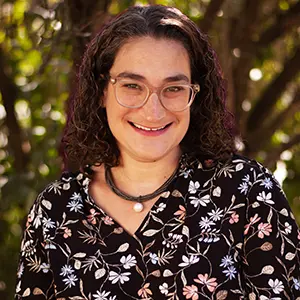 By: Rabbi Rebecca Kamil
By: Rabbi Rebecca Kamil
“Oh I don’t need a chaplain, I’m not religious.”
“I haven’t been to church/synagogue/a mosque/house of worship in ages.”
“I’m not dying, what do I need a chaplain for?”
These are all common responses when people are asked if they want to talk to or engage with a chaplain. There are often negative associations with chaplains: that we are there to give bad news, that we only want to provide prayer, or that we are not able to talk to someone who isn’t affiliated with a particular faith tradition. These couldn’t be further from the truth, yet these perceptions persist. As a chaplain, I am here to debunk some of these myths about chaplaincy, and share why YOU might benefit from a conversation with one.
What is a chaplain?
A chaplain is a professional who provides emotional and spiritual support. We help people navigate illness or difficult times through compassionate and empathic presence. We are there to help people find meaning and hope, and are supportive, non judgmental resources for those who are suffering.
Chaplains have existed for centuries in a variety of settings, including prisons, in the military, and in hospitals, hospices and long term care facilities. (Cadge and Rambo, 2022) There are even some for profit companies that have chaplains, including Tyson foods. We are not there to proselytize, to preach or to impose any religious doctrine on anyone. We are simply there to listen, to hold and lift up emotions, and to help people navigate challenges in their lives.
How are chaplains trained?
Chaplains go through rigorous training. In addition to ordination or a masters of Divinity, chaplains participate in Clinical Pastoral Education, (CPE) which combines didactic and clinical learning. In order to be board certified as a chaplain, which is the highest standard one can achieve, a chaplain needs at least 4 “units” (16 weeks each) of CPE. Once this is completed, a chaplain then works for 2000 clinical hours and sits before a board to gain certification by an accrediting chaplaincy organization. Additionally, chaplains need 50 hours of continuing education each year to maintain their certification.
What do chaplains offer?
Primarily, chaplains are there for support. We come with no prejudice or bias, no preconceived notions or agenda. We are there to meet you where you are. We can offer grief/bereavement support, exploration of coping mechanisms, spiritual/theological reflection, meaning making, and goals of care conversations. Some chaplains do guided meditation, reiki or healing touch.
Why might I want to talk to a chaplain?
As a patient with CLL or their caregiver, there are so many reasons to talk to a chaplain! Your process is unique to you, but there are several stages to your journey that may be helpful to go through with the support of a chaplain.

These spiritual/emotional challenges that come with each phase of the illness can be helpful to work through with a chaplain. We can be supplemental to the support groups, a therapist or other mental health professional, or even your own clergy. There is even research that shows visits with a chaplain can improve quality of life and helping with decision making. (Balboni, et al 2010)
I’m not in a hospital, so how would I talk to a chaplain? Is virtual chaplaincy even possible?
While medical care has moved from hospital to outpatient and even home settings, health care chaplaincy has only minimally evolved. One of the earliest descriptions of outpatient chaplaincy dates back over 25 years (Mandziuk, 1996) but it still isn’t well reported. Health care tele-chaplaincy is similarly new and rare, (Sprik et al., 2022) while tele-visits by physicians, mental health professionals and even rehab therapists are now widely available. There is no reason why chaplaincy couldn’t also be done virtually as well.
I’m not religious/haven’t been to a house of worship in ages/am a staunch atheist. Can I still connect to a chaplain?
Absolutely. We are not there to impose any religious doctrine or agenda. Rather, we are there to connect with you on whatever gives you meaning and purpose. Our goal is not to talk about faith/religion if you don’t want to or if it’s not a significant part of your life, our goal is to meet you where you are and help you find ways to cope through each stage of your illness.
To speak with Rabbi Rebecca Kamil as part of CLL Society’s Emotional and Spiritual Advocate Program, please sign up below.
Rabbi Rebecca Kamil is a board certified chaplain and rabbi who has worked in a variety of healthcare settings, including hospice, long term care, acute care and behavioral health. Rebecca has expertise in helping people navigate various stages of illness, discuss goals of care and health care directives, and provides emotional and spiritual support. Rebecca has worked with people of all faith backgrounds and those with no faith connection, and brings a non judgmental presence to those she cares for. Rebecca is the daughter of a CLL Society member and has experience working with individuals managing chronic illness. Rebecca lives in Minneapolis with her husband and son.

















